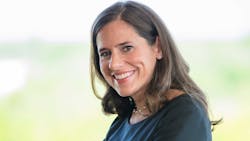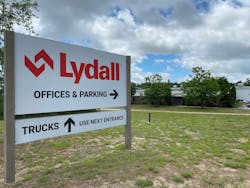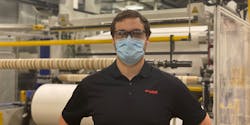For a New CEO, COVID Is the Ultimate Trial By Fire
Lydall, a public company that manufactures specialty filtration materials for industrial and automotive uses, had been going through a rough patch when Sara Greenstein took over as CEO in November 2019. Sales and profits were down at the $800 million company with operations in the U.S., Europe and China, thanks in part to trade uncertainty hurting sales to China in its technical nonwovens segment.
“For the past several quarters, our financial performance has been both unpredictable and unacceptable, but we have the resources and tools to fix that,” Greenstein wrote in her letter to shareholders in the company’s 2019 annual report.
Greenstein’s goal was to build on the company’s strengths, including “a team that is highly engaged with our customers, serving as their trusted partners and caring deeply about their success.” Her vision included increasing collaboration between the company’s three business segments—performance materials, technical nonwovens and thermal acoustical solutions–and “improving communications and driving accountability.” (The thermal acoustical solutions segment mainly serves automotive; Ford is Lydall’s biggest customer, accounting for more than 10% of Lydall’s overall sales in recent years.)
Greenstein has built her reputation on transformation. At U.S. Steel Corp., she led the $4 billion Consumer Solutions division, implementing lean manufacturing, adding structure to business processes and focusing on product development with closer customer collaboration. The result: a 300% increase in EBITDA (earnings before interest, taxes, depreciation and amortization) in her division.Before U.S. Steel, Greenstein was senior vice president, chief marketing and strategy officer at Underwriters Laboratories, focused on transforming the company from a not-for-profit specializing in product safety testing to a for-profit focusing on risk management, secure supply chains and environmental sustainability.
Two months into her tenure at Lydall, the COVID-19 pandemic upended everyone’s playbooks. IndustryWeek talked to Greenstein about how Lydall is faring and what’s ahead.
There is some good news on the horizon: In June, the company landed a $13.5 million Department of Defense contract to create two production lines in New Hampshire to manufacture the filtration layer for N95 and surgical masks. Likening masks to armor, Greenstein considers the pivot—allowing Lydall to produce that item for 1.7 billion N95 respirators or 6.5 billion surgical masks per year—a stepstone to new possibilities in advanced air filtration. The first line announced will be commissioned in fall 2020; the second, likely in spring of 2021.
In addition, Lydall is producing other materials for face masks, like the tie straps, and ramped up its production of needlepunch felt for hospital gowns, medical wipes and absorbent bed pads.
Why is the mask contract important, beyond the $13.5 million—which is not insignificant but also not a huge piece of business?
It’s a significant indication of the fact that having reliable high-quality local manufacturing and technology for things that are life and death is critical.
What COVID has taught us is that we must be able to localize and bring back the critical parts of the supply chain, for a few reasons. One, in times of catastrophe, time matters. And we cannot rely on the complicated and decentralized chain to deliver mission-critical elements like PPE. And when things like a pandemic happen where everyone in the world is affected, foreign countries understandably prioritize the material that they make in their own countries to go to their own needs first.
As a country, we need to be able to make this product not just for PPE, but also for the filtration of places. Yes, the immediate demand is for PPE, but this investment and commitment to technology and innovation goes beyond just PPE into air quality.
We are viewed as the gold standard in our industry and so it made a lot of sense to have the government partner with us to expand this capability. That same capability and capacity will be used again, to provide very highly engineered filtration media to improve indoor air quality.
The melt-blown capacity on the performance materials side of the business is producing the mask filtration. Tell me about Lydall’s other two segments.
Our thermal acoustical solutions serves the automotive market globally, providing solutions to almost every automotive OEM around the globe. And then we have our technical and non-woven business. That business has been very actively engaged in serving the need for PPE around medical gowns and medical wipes. And as our automotive business was completely down in Europe and the U.S., in March and April, we converted some of our capability to a clean, sew and cut room similar to Carhartt and others. We took the employees that were willing and able and brought them in and set up clean sewing centers and have them making masks not only for our Lydall employees but also our local first responders in the communities in which we work, and we donated those.
What measures have you had to take around COVID with your 3,300 employees? In March, you had to lay off about 1,000 employees globally.
We really started navigating COVID in China in January, February. And so at that time, we established our crisis team, our kind of COVID leadership team to help our employees and our customers and suppliers navigate what was happening in China. And then very quickly became apparent in March, as the automotive OEMs started to shut down in Europe and the U.S. that we had to prepare ourselves. At that time, it was almost like a bifurcated existence. We had to bring our automotive manufacturing sites across Germany, France and the U.S. down immediately while we were trying to ramp up and ensure safety so we could work 24-7 in our material sites to make the PPE and adapt any site where we could make and contribute to the immediate need that COVID presented. So we did have to furlough a significant number of employees in our automotive business.
We put very stringent safety guidelines in place at every single site across the globe where we operate. We have twice-a-day calls so that we know how many people we’ve had quarantined, and communicate that broadly to the employee base every week within each country. As our customers’ demand started to come back in the automotive sector, so, too, would we bring people back. The good news is we had a playbook for how to do that safely and well, given what we’d all weathered in China. As we started to bring employees back as customer orders resume, we’ve been pretty successful at keeping everybody safe and productive.
You came on board as CEO with new ideas, then you’d barely settled in and had COVID to deal with. Has this changed your game plan or your vision for the company?
As you can imagine, it’s not only COVID that we’ve been dealing with here in this past quarter. We’ve had a lot of things going on around the world that affect our employees and each of us as humans. So what I would say is that COVID highlighted in a way that I couldn’t imagine the strength of Lydall. Lydall and our people are so committed to our customers and produce such high-quality, technically sound products that this pandemic, as horrific as it is, provided an opportunity for the people of Lydall to rise to the occasion. Whether it’s coming to work every day in France and the U.S. in some of the hardest-hit areas to make the products that we desperately need; or it’s understanding that we have to furlough hundreds of people in a matter of days because the automotive market shut down, and sticking together as we weather this. Every group in Lydall wanted to know how well others were faring, because this pandemic knew no borders.
This defines the unifying purpose that our people have across the globe and we continue to deliver. I’m humbled, actually to lead this business and these folks.
How did your leadership approach change once COVID hit?
I think learning agility is critical no matter what you do, and that’s at the core of who I am. In terms of did I have to change anything? I’m a very simple person. My core values are pretty clear. I believe very much in honest, open, fact-based, transparent communications at an executive level to keep it simple. I always say, “Seek simplicity.” Certainly as big organizations we crave complexity. And it’s unproductive.
We started a global townhall every week so we heard what was happening at our facilities and I answered questions. It was a way for us to bring global Lydall together as we navigated this. The biggest change that I’ve had to make is leading through a camera. I’m a leader who prefers to be with our people. I traveled the globe from the time I started until we couldn’t anymore, so that’s an adjustment, and if anybody’s got it perfected, I’d love to know. I’m handling it by being myself and showing how I’m working just like probably everybody else at home is working. On one of the town halls, I shared a picture of my [young] son who would wake up with me early every Wednesday when I do the town halls, and I joked that he was my IT director. And I got so many comments about, “Oh, my gosh, that’s great. That’s exactly what we’re doing.” It doesn’t matter what country you’re in—everybody has changed on a dime. If you’ve got a good culture and people who are purpose-driven, it helps you stay connected.
Got a manufacturing C-Suite candidate for Profiles in Leadership? Contact [email protected].
About the Author

Laura Putre
Senior Editor, IndustryWeek
As senior editor, Laura Putre works with IndustryWeek's editorial contributors and reports on leadership and the automotive industry as they relate to manufacturing. She joined IndustryWeek in 2015 as a staff writer covering workforce issues.
Prior to IndustryWeek, Laura reported on the healthcare industry and covered local news. She was the editor of the Chicago Journal and a staff writer for Cleveland Scene. Her national bylines include The Guardian, Slate, Pacific-Standard and The Root.
Laura was a National Press Foundation fellow in 2022.
Got a story idea? Reach out to Laura at [email protected]


